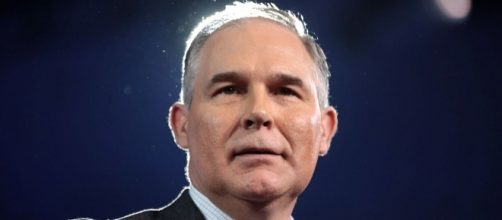EPA head Scott Pruitt told ABC This Week with George Stephanopoulos the 2015 Paris Climate Agreement to avert global warming was “a bad deal” for the U.S. He said President Donald Trump will sign an executive order this week killing President Obama’s Clean Power Plan (CPP). Pruitt added we need to get things done domestically using the existing Clean Air Act, and not with new regulations.
The CPP was crafted by the EPA to avoid legislative scrutiny while putting coal-fired power plants out of business. Plant owners were heartened when the Supreme Court gave the CPP an unprecedented stay until it was fully litigated in the courts.
That stay may be for naught if Trump keeps his promise and kills the plan. Environmentalists have pledged to sue the Trump administration if they kill the plan.
When the EPA’s rule was announced, many power plants switched to natural gas or were shuttered altogether. It was too costly to retrofit coal plants to meet the stringent new standards but cheaper to convert to natural gas. More closed down, forcing thousands of coal miners out of work and decimating coal country. Trump campaigned on restoring coal jobs across America.
Trump Readies ‘Energy Independence’ Order To Repeal Obama Climate Policies https://t.co/NnnmbPL4Ji pic.twitter.com/jU7LoAyFxR
— The Alt Standard (@TheAlt_Media) March 27, 2017
Energy Independence Executive Order
Pruitt also pointed out the Obama administration was “very anti-fossil fuel strategy, coal, natural gas and the rest” and Trump planned to change that by creating new jobs, restoring clean coal-fired plants, and slashing electricity prices for consumers.
He also said the president will sign the “Energy Independence Executive Order,” which would ensure the U.S. had a “pro-growth and pro-environment approach to how we do regulation in this country.”
Pruitt was the former attorney general for Oklahoma and has sued the EPA over a dozen times for overstepping its authority. He also spearheaded opposition to the CPP while he was the attorney general, which was one of the reasons Trump chose him. Pruitt said people are under the false impression that if you’re "pro-growth, pro-jobs, your anti-environment."
#China’s emerge as the world’s top emitter of #greenhouse gases #Pollution https://t.co/ziAIJrO3h7 pic.twitter.com/Iz8nBKZsz7
— Abae Akili (@abaeakili) September 18, 2016
Top emitters get free pass
He told Stephanopoulos that China and India, the largest emitters of carbon dioxide (CO2), got a “free pass” in the Paris Climate Agreement.
Indeed, China and India don’t have to curtail CO2 emissions until 2030, and that’s only if it’s economically viable. Pruitt said we’ve essentially “penalized ourselves” via lost jobs, whereas China and India haven’t taken steps to “address the issue internationally.”
China emitted about 10,600 megatons of CO2 in 2015 while the U.S. produced half that much. For the past three years, global CO2 emissions have remained flat leading many to wonder if we need a Paris accord to fight climate change. Because the agreement isn’t a treaty, the U.S. can withdraw from it at any time.

